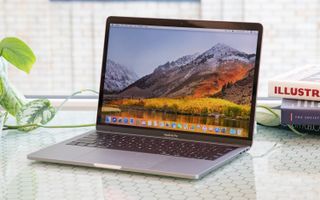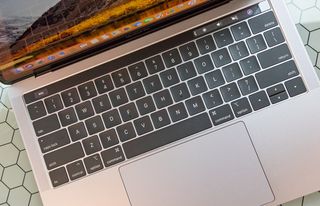MacBook Pro 2018 Keyboard: How Good (or Bad) Is It?
Yes, the new MacBook Pro 2018 is a lot faster than previous MacBooks, but many people are wondering whether Apple has improved its keyboards.

If we're talking about durability, things look promising, as a teardown from iFixit found that the keyboard on the new MacBook Pro has a silicone cover under every key. That should cut down on debris and the dreaded sticky-key issue that led to a class-action lawsuit and Apple instituting a repair program.
Apple also says the MacBook Pro 2018's new keyboard is quieter. But is it really? And does it feel any different from its predecessor? To find out, we put both the new 13-inch MacBook Pro with Touch Bar and the 2017 model in front of five staffers — without telling them which was which. Each tester evaluated the keyboards using the 10FastFingers.com typing test.

Interestingly, in our testing, the older 2017 MacBook Pro produced not only a slightly faster typing speed (87.6 versus 85.8 words per minute) but also a lower error rate (92.8 percent versus 91.6 percent accuracy).
Overall, though, the reactions were mixed, and most of our testers disliked the shallow 0.55 millimeters of key travel on Apple's third-generation butterfly mechanism, which is the same as before. Read on for our impressions.
2018 vs. 2017 MacBook Pro Keyboard: Test Results
| Row 0 - Cell 0 | 2018 MacBook Pro | 2017 MacBook Pro |
| Mark | 76 wpm, 95% accuracy | 75 wpm, 93% accuracy |
| Henry | 74 wpm, 95% accuracy | 73 wpm, 96% accuracy |
| Caitlin | 105 wpm, 96% accuracy | 102 wpm, 95% accuracy |
| Sherri | 69 wpm, 82% accuracy | 75 wpm, 84% accuracy |
| Phillip | 105 wpm, 90% accuracy | 113 wpm, 96% accuracy |
| Average | 85.8 wpm, 91.6% accuracy | 87.6 wpm, 92.8% accuracy |
Stay in the know with Laptop Mag
Get our in-depth reviews, helpful tips, great deals, and the biggest news stories delivered to your inbox.
Mark Spoonauer (Editor-in-Chief, Laptop Mag and Tom’s Guide)
2018 MacBook Pro: 76 wpm, 95% accuracy
2017 MacBook Pro: 75 wpm, 93% accuracy
As someone migrating from a 2016 MacBook Pro 13-inch for these tests, I thought both the 2017 and 2018 models were a step up. But I preferred the 2018 MacBook Pro's keyboard because I was a bit more accurate as I typed and because the keys provided slightly cushier feedback.
On the 10FastFingers test, my speed was practically identical across the two machines, but I posted two more wrong words on the 2017 MacBook Pro than on the 2018 version. I give the newer notebook a slight edge.
Henry T. Casey (Senior Writer, Laptop Mag and Tom's Guide)
2018 MacBook Pro: 74 wpm, 95% accuracy
2017 MacBook Pro: 73 wpm, 96 % accuracy
Hilariously enough, I confused the 2018 MacBook Pro for the 2017 model during the typing test, as I was familiar with the overall experience from testing the 15-inch version of the older laptop for a month at home. I only discovered I was typing on the newer model when I checked System Preferences to see which laptop had True Tone.
So, no, the keys didn't sound especially quieter on the modern model, as I thought it was the previous model. I couldn't tell the difference when I clicked on each, back and forth, listening for a difference. My 10fastfingers.com test scores were pretty much the same, with 74 wpm on the 2018 model and 73 wpm on the 2017 model.

Caitlin McGarry (Senior Writer, Tom's Guide)
2018 MacBook Pro: 105 wpm, 96% accuracy
2017 MacBook Pro: 102 wpm, 95% accuracy
I didn't know which MacBook Pro I was using before I sat down to test the keyboards. But I do have a 2017 MacBook Pro at home, so the 2017 model at least seemed familiar. The 2017 Pro's keys felt more pleasantly clickier — highly technical term, I know — than this year's model, but perhaps that's because it's the keyboard I'm accustomed to typing on every day.
The two keyboards felt noticeably different to me. The 2018 model was quieter and more responsive, resulting in better scores on the 10FastFingers test. I preferred the feel of the 2017 Pro, but I can't deny that I typed faster and more accurately on the new version.
Sherri Smith (Editor, Laptop Mag and Tom's Guide)
2018 MacBook Pro : 69 wpm, 82% accuracy
2017 MacBook Pro: 75 wpm, 84% accuracy
Let me go on record as saying that I'm not a fan of either the 2017 or the 2018 MacBook Pro keyboards. Neither system provides the bouncy, feedback my work laptop — a 2015 MacBook Pro 15 — delivers.
After trying the typing test on both, I prefer the 2017 iteration, as it has enough cushion to give my fingers a little protection from bottoming out. And that slight springiness helped me get a higher word count and better accuracy, but not by much.
Phillip Tracy (Senior Writer, Laptop Mag)
2018 MacBook Pro: 105 wpm, 90% accuracy
2017 MacBook Pro: 113 wpm, 96% accuracy
The two keyboards felt practically identical to me. Only when I compared them side by side did I notice minor differences — namely, that the older MacBook Pro is louder and has more tactile feedback than the new model, and that the keys on the 2018 model feel softer and mushier. Because of this, the 2017 MacBook Pro keyboard was more comfortable to type on, despite the slightly louder volume.
That said, both keyboards are pretty bad. They have very low key travel, and the butterfly mechanism feels stiff. If I had to choose between them — and everyone around me wears headphones anyway — I'd pick the keyboard on the 2017 MacBook Pro.
Bottom Line
When it comes to words per minute and accuracy, our results give the nod to the 2017 MacBook Pro's keyboard. But does that mean the 2018 keyboard is worse? Not necessarily. It comes down to whether you prefer less noise and what seems to be a slightly different touch on the newer MacBook Pro. Some might call it cushier, while others would say mushier.
MORE: Apple MacBook Pro 13-inch with Touch Bar (2018) Review
The bigger test will happen over time, as we'll be living with the 2018 MacBook Pro to see if the new protective layer keeps the keys from getting stuck.
Credit: Laptop Mag
